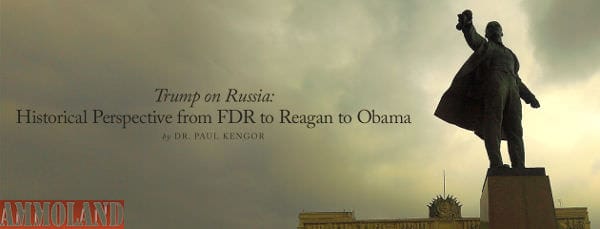by Dr. Paul Kengor
This article first appeared at Conservative Review.


Grove City, PA -(Ammoland.com)- There is real danger in Donald Trump’s statements and attitude toward Vladimir Putin and Russia. “Putin likes me,” glowed Trump in a July 25, 2016 Tweet.
On ABC’s “This Week” on Sunday, Trump basked in the warmness that he’s apparently feeling from the Russian authoritarian: “He has said nice things about me over the years,” Trump admired of Putin. “I remember years ago, he said something, many years ago, he said something very nice about me.”
Trump reciprocates the love he believes he feels. He seems to genuinely like Putin, given that, as he says, “Putin likes me.” And we’ve come to painfully see that there’s nothing that Donald Trump likes more than people who like him. (Conversely, there’s nothing that Donald Trump dislikes more than people who don’t like him, or merely criticize him.)
I think this legitimately raises serious questions over whether a Trump foreign policy toward Vladimir Putin and Russia would be personality-driven as much as (if not more than) policy-driven. That’s not an unfair assumption to make, and not just in the case of Donald Trump (though especially in his unique case). Any student of international relations knows that personalities and relationships among leaders can influence and even drive policy, and sometimes with bad results. It was certainly a factor in the fatal miscalculations in U.S.-Russian relations made by Franklin Roosevelt.
“I think I can personally handle Stalin better than either your Foreign Office or my State Department,” FDR oddly boasted to Winston Churchill on March 18, 1942. “Stalin hates the guts of all your people. He thinks he likes me better.”
“He likes me.” Sound familiar?
Stalin showed that “like” of FDR by rolling over Eastern Europe, hammering everything from the Ukraine to Poland. He abused FDR’s goodwill. Not until literally days before he died, just weeks after Stalin preyed upon his trust at Yalta, did FDR finally learn and admit he had been wrong about Stalin.
“Averell [Harriman] is right,” FDR sighed to Anna Rosenberg on March 23, 1945, less than three weeks before he died. “We can’t do business with Stalin. He has broken every one of the promises he made at Yalta.”
FDR’s tragic mistake was thinking that the Russian leader liked him and thus would “work with me for a world of democracy and peace” (yes, FDR actually said that about Stalin).
And yet, FDR, mistaken as he was, never suffered the significant personality issues that plague Donald Trump. Trump’s ignorance of policy and lack of any firm grounding in a set of bedrock principles is outdone only by a strikingly excessive sense of self, which would make a President Trump easily open for exploitation by a cynically manipulative foreign leader like a Vladimir Putin—a leader who learned the art of manipulation in the KGB.
The “Putin-likes-me” attitude of Trump is a fatal conceit, and it’s something that Donald Trump should have learned from watching two terms of Barack Obama’s naïve statements and attitude toward the Russians. It is also the polar opposite of Ronald Reagan’s statements and attitude toward the Russians.
Let’s briefly recall what happened with Obama, who likewise was convinced that Putin and the Russians liked him.
Go back to September 17, 2009. It was on that date that our freshman president horrified our devoted post-Cold War allies, Poland and the Czech Republic, former Soviet Bloc captive nations, by cancelling plans for a joint U.S. missile shield. It was a stunning betrayal by Obama of two magnificent allies who loved and trusted America and who loathed and distrusted Putin’s Russia.
That date is actually a date of infamy to Poles. It was September 17, 1939 that Stalin’s Red Army, enforcing the bloody terms of the Hitler-Stalin Pact, invaded Poland. That Obama cancelled the missile shield on that date was viewed by Poles (justifiably or not) as an intentional slap in the face, especially given that he did so in order to accommodate Russia. The Poles have a long, painful history of watching the West and Democratic presidents accommodate Russia at their expense. (“I had come there [to Tehran] to accommodate Stalin,” FDR would tell his aide Frances Perkins.)
Poles ever since have harbored a deep fear that Barack Obama will not defend them. They see Obama as a weak leader who the Russians realize they can roll right over—which brings me to the Ukraine.
What unfolded in the Ukraine was blanket aggression by Vladimir Putin, and Barack Obama should not be completely exempt from all blame. Throughout his presidency, Obama had bent over backward to assuage the Russians, to mollify them, to assure them that he was in their corner.
Remember Obama’s pledge to Dmitri Medvedev, Putin’s lap-dog: Obama gave his private assurance to Putin via Medvedev—inadvertently caught on tape by an open mic—that, in regard to defense and nuclear issues, he would “have more flexibility” “after my election.” A pleased Medvedev thanked Obama, smiling and telling him, “I will tell Vladimir.”
This, like the cancellation of the joint missile shield in September 2009, was another Russian-accommodation gesture by Obama that horrified Poles. And then came yet another: Not long thereafter, President Obama rejected the world’s most powerful living symbol of anti-communism, anti-Sovietism, and victory in the Cold War: Lech Walesa. The White House declined to have Walesa stand in for the late Jan Karski, who posthumously received the Presidential Medal of Freedom. Our president spurned Walesa, the first president of a freed post-Cold War Poland, who had once risked everything to courageously join Ronald Reagan and Pope John Paul II in keeping Solidarity alive as the wedge to split the Communist Bloc from top to bottom. Walesa had a vital role in helping to liberate Eastern Europe and achieve peaceful victory in the Cold War. Obama’s snubbing of Walesa further angered the people of Poland.
Alas, how did Putin thank Obama for his friendship and all the goodwill? He invaded the Ukraine, surely knowing that his accommodating pal in the White House would not do anything to stop him, maybe even thinking Obama wouldn’t protest at all.
Naturally, the neighboring countries around Ukraine were immediately worried. They were deeply concerned over the next move by an ex-KGB lieutenant colonel named Vladimir Putin, who fancies himself a modern Vlad the Great, and who desires to expand the Russian motherland to something approaching the grand old Soviet days. The Estonians were worried. The Latvians were worried. The Poles were worried.
I saw those fears closely. I frequently contribute to a Polish publication, do interviews with Polish journalists, email regularly with Polish historians and friends, and two of my books on Ronald Reagan have been translated by Polish publishing houses. I have many contacts there. “Professor, do you think Poland is next?” I was asked by a Polish reporter after Putin’s tanks stormed the Ukraine. Poles feared not only a Putin invasion; they feared Barack Obama would not lift a finger to help them, even though Poland is a member of NATO.
Alas, here I’m reminded of a very different worldview toward the Russians, by another president. “If you were going to approach the Russians with a dove of peace in one hand, you had to have a sword in the other,” said President Ronald Reagan. “We had to bargain with them from strength, not weakness.”
Reagan’s motto toward Russia was dovorey no provorey, Russian for “trust but verify.”
That was not what Barack Obama did. Obama had approached Putin with a dove in one hand and a bouquet of roses in the other—and with plenty of promised “flexibility.” Obama showed weakness, not strength. And the Russians exploited it. Putin abused it.
Reagan understood the Russians. Obama did not. And if you think that didn’t matter, just look at the differences on the ground in places like the Ukraine.
Reagan took pride in the fact that the Russians didn’t gain “one inch of ground” while he was president. Indeed they did not—and after they had picked up nearly a dozen satellite states in the immediate years before Reagan was elected, under Presidents Jimmy Carter and Gerald Ford.
And that brings me back to Donald Trump. Trump is a textbook narcissist, meeting the literal definition of the term. Putin is a Machiavellian, schooled and trained by the KGB. Surely Putin and his advisers (the Russians are genius in their uncanny psychological profiles of foreign leaders) have discerned how obviously easy it is to get Donald Trump on your side. You simply say nice things about him. Just suggest that you like him and you will have him. He is easily flattered, and the Russians are shrewd flatterers.
That being the case, I really worry that Putin would play Trump like a fiddle, maybe even more than he played Obama.
Trump enthusiasts will recoil at the suggestion that their alpha-male strong-man—one Trump advocate described Trump to me (approvingly) as “Putin-esque”—would not stand up to Putin and the Russians if he became president. But I don’t share their confidence at all, especially given Trump’s ongoing soft assessments of Putin’s annexation of the Crimea. I’m sure Putin has a plan to play him right.
If Putin moved further against Ukraine or (heaven forbid) even Poland, would a President Trump blithely look the other way because “Putin likes me” and because they have a friendly relationship? Poland is a NATO member, but Trump’s attitude to NATO has been cavalier at best. And what if Poland’s leader, who’s a principled conservative, insulted a President Trump for being too pro-Putin? Trump would be incensed. He would blast the Polish leader as “horrible” because of the unforgivable Trumpian sin of not liking The Donald.
I think that Poles could be more worried about Trump than they were of Obama. At least a weak Obama appealed to NATO in the final analysis.
A “he-likes-me” attitude toward Vladimir Putin is not a solid basis for U.S. policy toward the Russians.
Donald Trump needs to remember what Ronald Reagan said. You approach the Russians, and especially a Russian like Vladimir Putin, from a position of strength, not weakness.

About the Author:
Dr. Paul Kengor is professor of political science and executive director of The Center for Vision & Values at Grove City College. His latest book is Takedown. His other books include 11 Principles of a Reagan Conservative, The Communist: Frank Marshall Davis, The Untold Story of Barack Obama’s Mentor and Dupes: How America’s Adversaries Have Manipulated Progressives for a Century.
